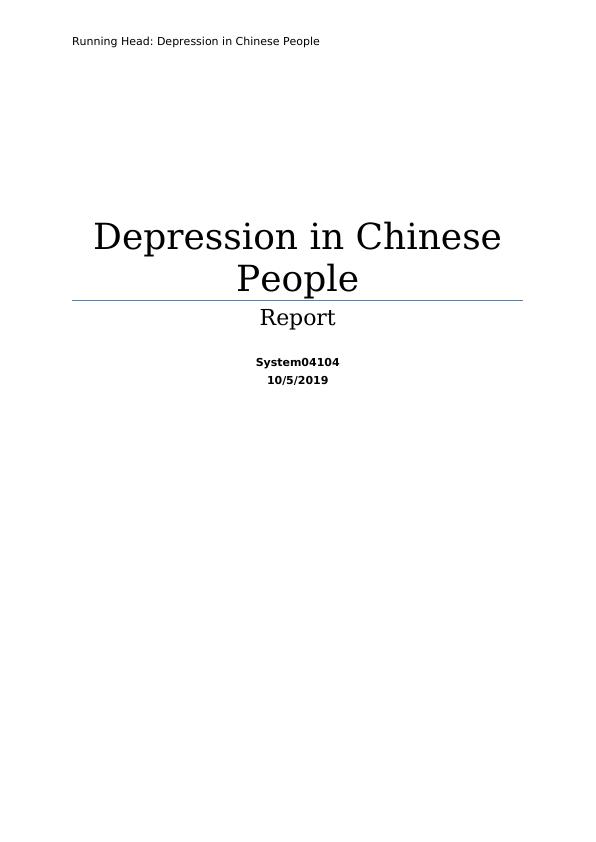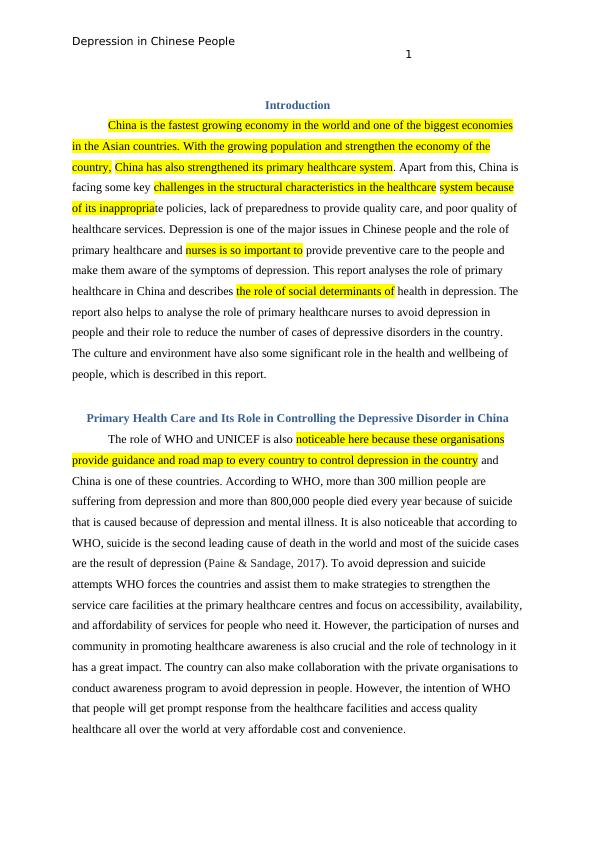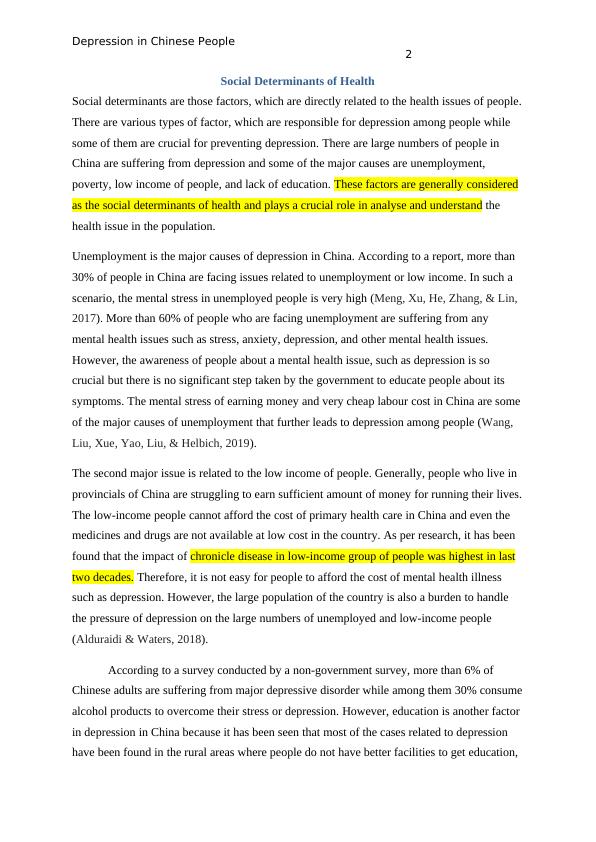Depression in Chinese People: Role of Primary Healthcare and Nurses
Added on 2022-10-01
8 Pages2690 Words480 Views
Running Head: Depression in Chinese People
Depression in Chinese
People
Report
System04104
10/5/2019
Depression in Chinese
People
Report
System04104
10/5/2019

Depression in Chinese People
1
Introduction
China is the fastest growing economy in the world and one of the biggest economies
in the Asian countries. With the growing population and strengthen the economy of the
country, China has also strengthened its primary healthcare system. Apart from this, China is
facing some key challenges in the structural characteristics in the healthcare system because
of its inappropriate policies, lack of preparedness to provide quality care, and poor quality of
healthcare services. Depression is one of the major issues in Chinese people and the role of
primary healthcare and nurses is so important to provide preventive care to the people and
make them aware of the symptoms of depression. This report analyses the role of primary
healthcare in China and describes the role of social determinants of health in depression. The
report also helps to analyse the role of primary healthcare nurses to avoid depression in
people and their role to reduce the number of cases of depressive disorders in the country.
The culture and environment have also some significant role in the health and wellbeing of
people, which is described in this report.
Primary Health Care and Its Role in Controlling the Depressive Disorder in China
The role of WHO and UNICEF is also noticeable here because these organisations
provide guidance and road map to every country to control depression in the country and
China is one of these countries. According to WHO, more than 300 million people are
suffering from depression and more than 800,000 people died every year because of suicide
that is caused because of depression and mental illness. It is also noticeable that according to
WHO, suicide is the second leading cause of death in the world and most of the suicide cases
are the result of depression (Paine & Sandage, 2017). To avoid depression and suicide
attempts WHO forces the countries and assist them to make strategies to strengthen the
service care facilities at the primary healthcare centres and focus on accessibility, availability,
and affordability of services for people who need it. However, the participation of nurses and
community in promoting healthcare awareness is also crucial and the role of technology in it
has a great impact. The country can also make collaboration with the private organisations to
conduct awareness program to avoid depression in people. However, the intention of WHO
that people will get prompt response from the healthcare facilities and access quality
healthcare all over the world at very affordable cost and convenience.
1
Introduction
China is the fastest growing economy in the world and one of the biggest economies
in the Asian countries. With the growing population and strengthen the economy of the
country, China has also strengthened its primary healthcare system. Apart from this, China is
facing some key challenges in the structural characteristics in the healthcare system because
of its inappropriate policies, lack of preparedness to provide quality care, and poor quality of
healthcare services. Depression is one of the major issues in Chinese people and the role of
primary healthcare and nurses is so important to provide preventive care to the people and
make them aware of the symptoms of depression. This report analyses the role of primary
healthcare in China and describes the role of social determinants of health in depression. The
report also helps to analyse the role of primary healthcare nurses to avoid depression in
people and their role to reduce the number of cases of depressive disorders in the country.
The culture and environment have also some significant role in the health and wellbeing of
people, which is described in this report.
Primary Health Care and Its Role in Controlling the Depressive Disorder in China
The role of WHO and UNICEF is also noticeable here because these organisations
provide guidance and road map to every country to control depression in the country and
China is one of these countries. According to WHO, more than 300 million people are
suffering from depression and more than 800,000 people died every year because of suicide
that is caused because of depression and mental illness. It is also noticeable that according to
WHO, suicide is the second leading cause of death in the world and most of the suicide cases
are the result of depression (Paine & Sandage, 2017). To avoid depression and suicide
attempts WHO forces the countries and assist them to make strategies to strengthen the
service care facilities at the primary healthcare centres and focus on accessibility, availability,
and affordability of services for people who need it. However, the participation of nurses and
community in promoting healthcare awareness is also crucial and the role of technology in it
has a great impact. The country can also make collaboration with the private organisations to
conduct awareness program to avoid depression in people. However, the intention of WHO
that people will get prompt response from the healthcare facilities and access quality
healthcare all over the world at very affordable cost and convenience.

Depression in Chinese People
2
Social Determinants of Health
Social determinants are those factors, which are directly related to the health issues of people.
There are various types of factor, which are responsible for depression among people while
some of them are crucial for preventing depression. There are large numbers of people in
China are suffering from depression and some of the major causes are unemployment,
poverty, low income of people, and lack of education. These factors are generally considered
as the social determinants of health and plays a crucial role in analyse and understand the
health issue in the population.
Unemployment is the major causes of depression in China. According to a report, more than
30% of people in China are facing issues related to unemployment or low income. In such a
scenario, the mental stress in unemployed people is very high (Meng, Xu, He, Zhang, & Lin,
2017). More than 60% of people who are facing unemployment are suffering from any
mental health issues such as stress, anxiety, depression, and other mental health issues.
However, the awareness of people about a mental health issue, such as depression is so
crucial but there is no significant step taken by the government to educate people about its
symptoms. The mental stress of earning money and very cheap labour cost in China are some
of the major causes of unemployment that further leads to depression among people (Wang,
Liu, Xue, Yao, Liu, & Helbich, 2019).
The second major issue is related to the low income of people. Generally, people who live in
provincials of China are struggling to earn sufficient amount of money for running their lives.
The low-income people cannot afford the cost of primary health care in China and even the
medicines and drugs are not available at low cost in the country. As per research, it has been
found that the impact of chronicle disease in low-income group of people was highest in last
two decades. Therefore, it is not easy for people to afford the cost of mental health illness
such as depression. However, the large population of the country is also a burden to handle
the pressure of depression on the large numbers of unemployed and low-income people
(Alduraidi & Waters, 2018).
According to a survey conducted by a non-government survey, more than 6% of
Chinese adults are suffering from major depressive disorder while among them 30% consume
alcohol products to overcome their stress or depression. However, education is another factor
in depression in China because it has been seen that most of the cases related to depression
have been found in the rural areas where people do not have better facilities to get education,
2
Social Determinants of Health
Social determinants are those factors, which are directly related to the health issues of people.
There are various types of factor, which are responsible for depression among people while
some of them are crucial for preventing depression. There are large numbers of people in
China are suffering from depression and some of the major causes are unemployment,
poverty, low income of people, and lack of education. These factors are generally considered
as the social determinants of health and plays a crucial role in analyse and understand the
health issue in the population.
Unemployment is the major causes of depression in China. According to a report, more than
30% of people in China are facing issues related to unemployment or low income. In such a
scenario, the mental stress in unemployed people is very high (Meng, Xu, He, Zhang, & Lin,
2017). More than 60% of people who are facing unemployment are suffering from any
mental health issues such as stress, anxiety, depression, and other mental health issues.
However, the awareness of people about a mental health issue, such as depression is so
crucial but there is no significant step taken by the government to educate people about its
symptoms. The mental stress of earning money and very cheap labour cost in China are some
of the major causes of unemployment that further leads to depression among people (Wang,
Liu, Xue, Yao, Liu, & Helbich, 2019).
The second major issue is related to the low income of people. Generally, people who live in
provincials of China are struggling to earn sufficient amount of money for running their lives.
The low-income people cannot afford the cost of primary health care in China and even the
medicines and drugs are not available at low cost in the country. As per research, it has been
found that the impact of chronicle disease in low-income group of people was highest in last
two decades. Therefore, it is not easy for people to afford the cost of mental health illness
such as depression. However, the large population of the country is also a burden to handle
the pressure of depression on the large numbers of unemployed and low-income people
(Alduraidi & Waters, 2018).
According to a survey conducted by a non-government survey, more than 6% of
Chinese adults are suffering from major depressive disorder while among them 30% consume
alcohol products to overcome their stress or depression. However, education is another factor
in depression in China because it has been seen that most of the cases related to depression
have been found in the rural areas where people do not have better facilities to get education,

End of preview
Want to access all the pages? Upload your documents or become a member.
Related Documents
Health Nursing and Midwifery Assignmentlg...
|9
|3437
|78
Assignment on Nursing Financelg...
|9
|1813
|34
Depression as Mental Health Condition in United Kingdomlg...
|17
|5235
|389
Role of Nurses in Underdeveloped Countrieslg...
|5
|1231
|229
Roles of Nurses in Improving Mental Health of Individuals and Communitieslg...
|5
|1288
|278
Epidemiology of Suicide in Australialg...
|23
|4986
|1